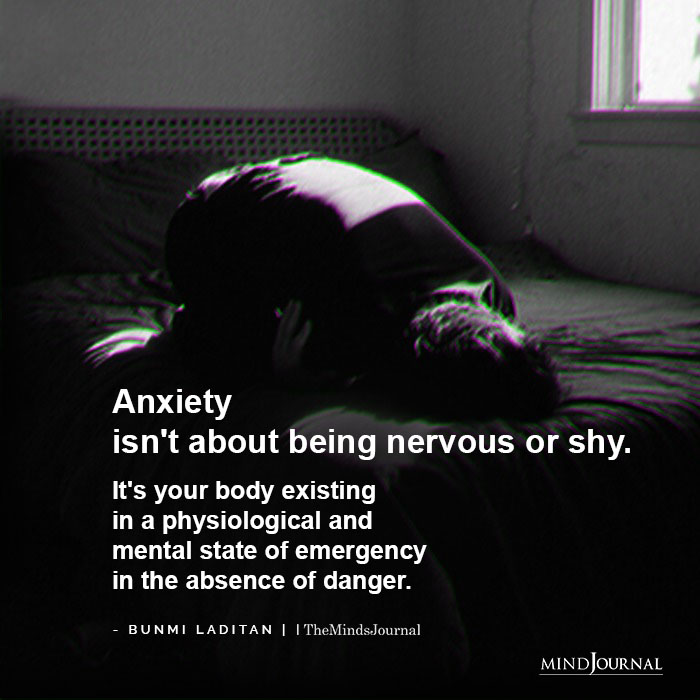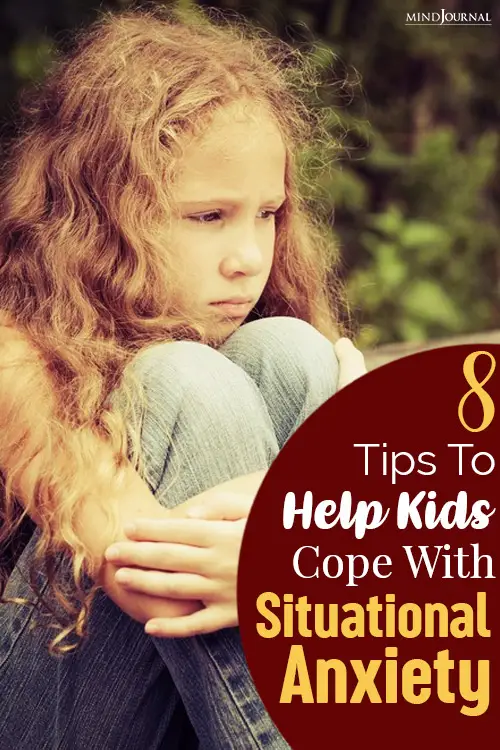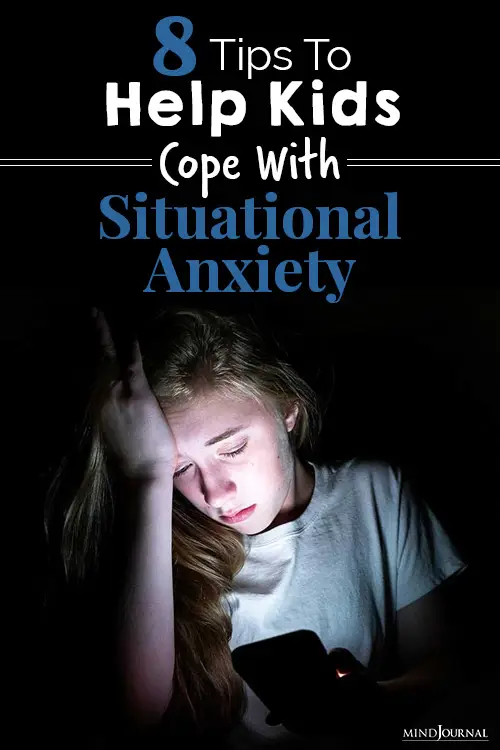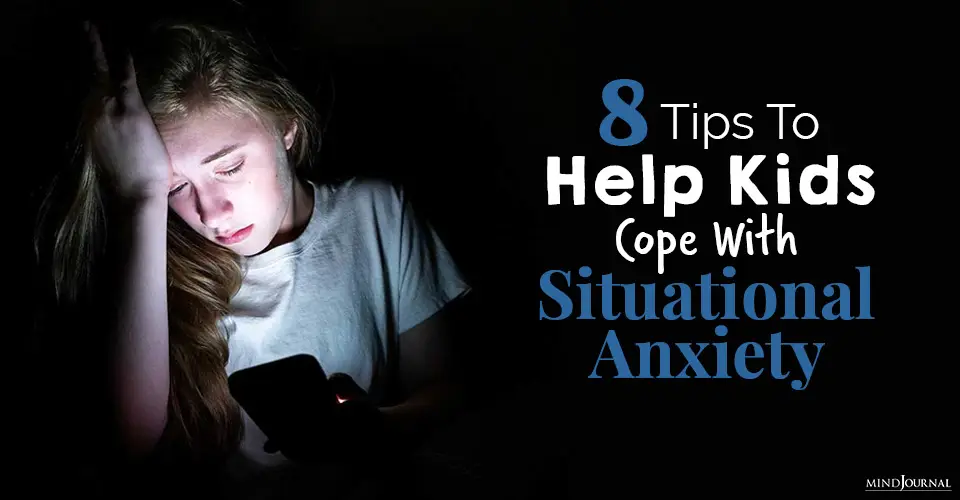Anxiety is a way we humans have evolved to protect ourselves.
In threatening situations, our brains release a string of responses that result in rapid heart rate, sweating, trembling, hyperventilating, and intense fear – all geared to prepare us for danger. This is the foundation for appropriate and adaptive anxiety.
But when this kind of “danger” response happens enough to significantly interfere with a child or teen’s social, academic, or recreational functioning, we call it a psychiatric disorder. Still, there are examples of when anxiety is not listed as an official disorder but can be disruptive for everyday life.
Let’s look at what has been called “situational anxiety.”
What Is Situational Anxiety?
Situational anxiety is a normal reaction to an adverse event in our lives. It’s typically unexpected or shocking or creates sudden hardship or excessive worrying about how it might negatively affect our lives. It’s often tied to feeling out of control. It can affect our kids – interrupting their busy schedules, and impairing their sleep, exercise, academics, and social life.
Some examples that send shock waves through our kids include natural disasters ( hurricanes, mudslides, forest fires), public health crises, mass shootings , cyberbullying, or sudden death or a loss.

Also read Situational Depression: 5 Symptoms You Should Inform Your Doctor
How Will I Recognize Situational Anxiety in My Child or Teen?
In general, anxiety may present with one or more of the following symptoms.
These are symptoms of panic attacks, that may be observable:
- Rapid heart rate
- Hyperventilation and shortness of breath
- Dizziness or fainting
- Sweating
- Pacing
- Blushing
Kids may also reveal other signs of anxiety:
- Fatigue
- Irritability or temper tantrums in younger kids
- Isolation
- Poor appetite
- Poor sleep
- Physical complaints: headaches, stomach aches, chest pain
- Reduced verbal responsiveness
- Expressions of worry

With situational anxiety, you likely will also notice a rather sudden change in behavior. Your child may behave in ways that are “out of character.”
Read 33 Lies Your Anxiety Tells You
8 Parent Tips To Help Children And Teens Cope With Situational Anxiety
Here is some guidance for parents to consider:
1. If the Situation Also Affects You, Take Care of Yourself
We are all shaken by sudden, unexpected, and at times devastating news events. Many people are profoundly concerned about climate change, natural disasters, or mass shootings. Remember that anxiety is “contagious,” and your kids will pick up on your emotional reactions. The most effective way to help them is to stay calm yourself. Here are some ways you can help diminish your own anxiety:
- Talk with supporters, such as a spouse, partner, friend, or relative. Talking about your worries is a great way to decrease anxiety.
- Take care of your physical health, including getting restful sleep and exercise.
- Use the methods you have found most helpful for reducing your own anxiety, such as yoga, meditation, prayer, listening to music, reading, journaling, or watching a good TV show.

Read How To Overcome Anxiety With Hypnosis
2. Initiate Conversations
Many times, your child will not approach you with their anxiety or concerns. This may be because they feel ashamed, worried that talking will make things worse, or that they will burden you. If you notice a change in your child’s behavior, there is no harm in saying: “I’ve noticed you haven’t been yourself, lately. Is anything troubling you?” Then, follow with open-ended questions – ones that let them respond with more than just “Yes,” “No,” or “Nothing.” The point of open-ended questions is to get more details that allow you to explore what’s going on. Examples include:
- What are you worried about?
- Can you tell me about your concerns?
- How are you feeling?
3. Think Developmentally
School-age children (ages 7-12) may have different anxieties about a situation than a teen (ages 13-18) or young adult.
Younger children are more concerned about their daily routines and activities. They also tend to see the world in concrete black and white terms. They often need simple explanations about what is going on and a clear statement that you, the parent or caregiver, will be there to protect them. They do not need to be swamped with news and information. For them, it is best to turn the TV and digital media off.
Teens and young adults think with more complexity. They can see beyond the here and now, and may worry about the impact of a situation on their life in the weeks ahead or even years from now. They may be concerned about a situation’s effect on their family, friends, community, or the earth.
For them, it may help to sit with them in front of the TV or computer and learn together about the situation in the news. Or if it is a local event, such as cyberbullying or a sudden death, have an in-depth conversation about what’s been happening. Older children and young adults need to process a situation, and this is best done through conversation.
4. Validate Feelings and Concerns
Kids of all ages need to know that you take their anxiety seriously and acknowledge how much it means to them. Whether it is rational or irrational, it is the reality of what your child is feeling and thinking. Try to uncover their feelings and concerns, and let them know that you understand and appreciate what they are feeling. Then you can have a conversation about the situation in a way that can help reduce their anxiety.
Read 13 Positive Phrases To Calm Your Child
5. Encourage Peer Support
Kids, especially teens and young adults with situational anxiety, often want to talk with friends about their concerns. Peer support has been shown to be very helpful in managing anxiety and is often best accomplished under the supervision of a trusted adult , lest the conversation escalates and increases anxiety.
Ask your child if they would like to talk with their friends and a trusted adult. Then, consider which adult could best provide guidance. This might be you or another parent, a valued teacher, coach, community leader, or member of your spiritual community.
6. Help Identify Self-Care Activities
Kids, as well as adults, benefit from activities that promote resilience and well-being. This includes getting good amounts of sleep and exercise. For all of us, a variety of activities may be helpful, such as the ones noted above for parents. The Clay Center has videos on Self-Care for Middle School, High School, and College along with a Tool Kit that may be used at home or in school to facilitate discussion.
Read 15 Art Therapy Exercises to Control Your Mind and Channel Your Emotions
7. Provide Perspective and Reassurance
All kids need to know that no matter the situation, there are ways to meet the challenge. For any particular situation, one strategy may naturally be better than another, but in general, we want to help them feel confident that something can be done. It is often helpful to think of a family story in which a significant hardship was overcome:
“Remember when Grandma died?” or “Remember when the hurricane hit us, and a tree fell on the house?” “We all stuck together, and with the help and support of our family and friends, we got through it.” Narratives such as these provide a foundation for resilience and hope.
8. Seek Professional Help
There are times when many of the above measures are insufficient to quell situational anxiety. It may be that your child is struggling with other mental health problems such as depression, an anxiety disorder, or a developmental disorder that make it very hard to bounce back. Or your child may be the kind of kid who is already anxious, moody, or rigid in thinking and gets “stuck” emotionally or in certain ways of thinking.
Read 11 Signs You Need To Talk To A Therapist
In these cases, professional help is invaluable. Talk with your pediatrician and get a referral to a mental health professional who can do a comprehensive evaluation and suggest a treatment plan. There are many effective treatments for anxiety, including cognitive behavioral therapy, other types of individual psychotherapy, family therapy, group therapy, and medications.
The bottom line is this: at some time or another, we all face difficult situations in our communities and around the world. With thoughtful, sensitive attention to the specific worries and concerns of our kids, we can help ease their current situational anxiety and lay an important foundation to deal with situational anxiety in the future.
This article originally appeared on and was written by the author (Dr. Gene Beresin) for the Clay Center for Young Healthy Minds. Republished with permission.










Leave a Reply
You must be logged in to post a comment.